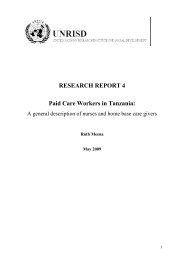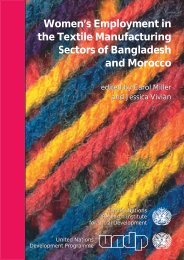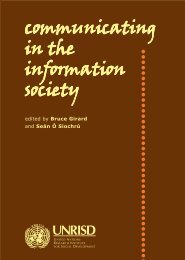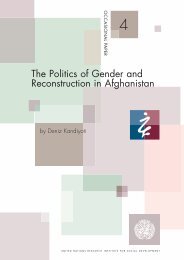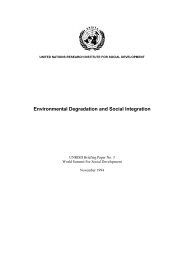Beyond Pragmatism: Appraising UN-Business Partnerships
Beyond Pragmatism: Appraising UN-Business Partnerships
Beyond Pragmatism: Appraising UN-Business Partnerships
You also want an ePaper? Increase the reach of your titles
YUMPU automatically turns print PDFs into web optimized ePapers that Google loves.
<strong>UN</strong>RISD PROGRAMME ON MARKETS, BUSINESS AND REGULATION<br />
PAPER NUMBER 1<br />
the Commission on Human Rights) and the system of Special Rapporteurs, as well as certain<br />
ILO entities.<br />
Corresponding debates and institutions related to the performance of TNCs, however, tend to<br />
be weaker. Entities like the Global Compact, as well as <strong>UN</strong>CTAD’s and the ILO’s work on CSR,<br />
focus to a large extent on best practice learning. Naming and shaming is rarely practised. The<br />
ILO review and complaints procedure associated with the Tripartite Declaration of Principles<br />
Concerning Multinational Enterprises and Social Policy Instruments is weak (ICHRP 2002). As<br />
noted above, an alternative approach did surface recently with the drafting, via the <strong>UN</strong> Sub-<br />
Commission on the Promotion and Protection of Human Rights, of the Norms on the<br />
Responsibilities of TNCs and other <strong>Business</strong> Enterprises with Regard to Human Rights. 83 But<br />
this initiative has lost momentum, particularly following the appointment of the <strong>UN</strong> Secretary-<br />
General’s Special Representative on <strong>Business</strong> and Human Rights in 2005, who in April 2006,<br />
pronounced that the Norms were “a distraction” and that institutional reform should pursue<br />
the route of “principled pragmatism”. 84<br />
If the <strong>UN</strong> is to continue on its current course of forging closer relations with TNCs, the learning<br />
and institutional environment within the <strong>UN</strong> needs to evolve in ways that are not currently<br />
much in evidence. Historically, the <strong>UN</strong> has contributed much by way of ideas, policy<br />
approaches and institutional arrangements conducive to equitable development (Emmerij et al.<br />
2006). Knowledge and learning associated with so-called critical thinking have been crucial in<br />
this process. The purpose of critical thinking is not, of course, simply to criticize. Rather it<br />
facilitates a particular mode of analysis that reveals precisely the sorts of issues that are often<br />
ignored in best practice learning, namely the complexities of power relations and how these<br />
affect outcomes, and the ideologies, agendas, contradictions and trade-offs involved in<br />
partnerships. 85 Critical thinking is useful for identifying “blind spots” and biases in analysis<br />
and policy agendas (Ocampo 2006).<br />
Concerning the <strong>UN</strong>’s relationship to the private sector in general, and partnerships with TNCs<br />
in particular, such thinking has been marginalized within the <strong>UN</strong> system. The lack of critical<br />
thinking is not simply a question of resources and priorities, or mindsets associated with<br />
pragmatism; it also has to do with imbalances and distortions that characterize knowledge<br />
management in international organizations. As in all public bureaucracies, there exist blind<br />
spots, questions that are not asked, turfs and perspectives to defend, skills sets that are not<br />
employed, jobs and promotions to protect, and self-censorship (Ocampo 2006; Toye and Toye<br />
2006). So-called “defiant bureaucrats”, that is, those that question mainstream views and<br />
policies, and implicitly or explicitly challenge authority, are few and far between (Toye and<br />
Toye 2006:93). This situation applies particularly to the Bretton Woods institutions but is also a<br />
feature of learning and knowledge management in parts of the <strong>UN</strong>.<br />
The relationship of several <strong>UN</strong> entities with the private sector may already be too close for<br />
comfort to allow for objective comprehensive assessments of partnerships along the lines<br />
suggested above. <strong>UN</strong>DP has to some extent reinvented itself, in part, due to its association with<br />
business. Throughout the 1990s, <strong>UN</strong>DP was an agency in search of a mission. It found that<br />
mission at the turn of the millennium by assuming a lead role in promoting poverty reduction,<br />
pro-poor growth and CSR in developing countries. <strong>Partnerships</strong> have been a crucial component<br />
of this shift in image and approach, with the agency acting as a broker for foreign investors<br />
wanting to work in developing countries and promoting the Global Compact at the national<br />
level.<br />
83<br />
84<br />
85<br />
The draft Norms contained not only a set of standards for TNCs that derived from international law but also a monitoring mechanism<br />
and complaints procedure.<br />
The Norms are, however, being tested by a group of major corporations involved in the <strong>Business</strong> Leaders Initiative on Human Rights.<br />
Rein et al. 2005; Richter 2004a; Zammit 2003.<br />
38




